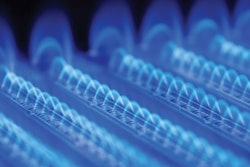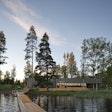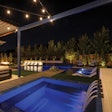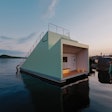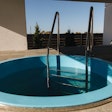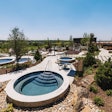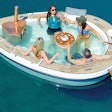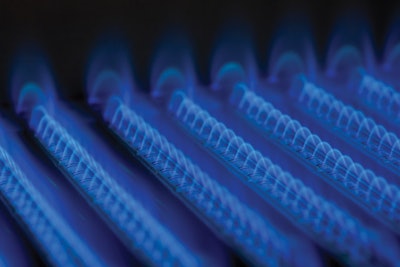
In the 2021 State of the Industry Survey, AQUA asked respondents to indicate the most important product attributes they consider when choosing a gas heater or heat pump. Their responses were quite revealing.
Energy efficiency was the leader — no surprise there — and considering the survey population, ease of installation and service was bound to be in the top three. But the survey found surprising support for things like automation compatibility and sound level.
The nine factors they cited, in decreasing order, are listed in the graph below.
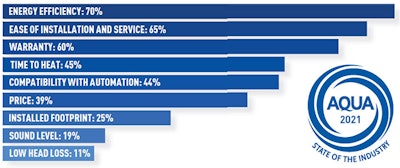
While the priorities of pool professionals aren't always in line with those of their customers, heater manufacturers note that the industry is evolving and consumers expect builders and dealers to keep up, especially when it comes to the digital revolution and IoT.
"The No. 1 thing we hear from consumers," says Gavin Chaze, eastern regional sales manager for Raypak, "is the question: 'Is there an app for this?'
We're making a luxury product that goes with a luxury item," he says. "The market isn't that huge. People think very carefully when they make that type of purchase, especially about their ability to control it conveniently."
RELATED: Heat Pumps and Gas: North vs. South
"A pool heater is a complex product," adds Zack Pickard, heaters product manager at Pentair. "That's why it's important to get training, read the manuals and consult with industry experts to make sure that you're confident in the installation process. That's always good, whether somebody is new to the industry or has been in it for years. Brushing up on skills and taking a class can really help you finish jobs faster and not get called back to the jobsite to check something again."
Both Pickard and Chaze recommend builders take advantage of the training programs heater manufacturers offer, which not only will strengthen their own knowledge and abilities but also allow them to better educate their customers about the product category.
Using the 2021 State of the Industry Survey responses as a guide, AQUA asked Chaze and Pickard to expound on the top five factors that influence pool professionals' selection of pool heaters and heat pumps.
ENERGY EFFICIENCY
First things first: Pool builders must help their customers distinguish between gas-fired heaters and heat pumps. While they both warm the water, they each operate differently and deliver varying degrees of energy efficiency.
Most standard residential pool heaters on the market today have an energy efficiency in the 82 to 84% range, according to Chaze and Pickard, while more costly high-efficiency heaters can generate up to 96% energy efficiency.
"I like to use the dollars and cents explanation, because everybody can connect with that," Pickard says. "If I say something is 96% efficient, what does that mean? A real-world example really clicks for people. I tell them, 'If you were to buy a dollar's worth of natural gas or propane, you're getting 84 cents worth of heat into the water with an 84% efficient heater, compared to 96 cents worth of heat with a 96% efficient heater. You're buying gas either way, but the higher-efficiency heaters are what's driving the most excitement right now."
Dealers with customers truly worried about energy efficiency should consider recommending a heat pump, which is about 600% more efficient than a gas heater, according to manufacturers. They can cost 40 to 60% more upfront than a gas heater, too. But unlike a gas heater, they harvest heat from the air and transfer it to the pool. "It's essentially free; you're just paying for the electricity to move that heat from the air into the water," Pickard says.
"A heat pump is built like the thermostat in a house when you set the thermostat and just leave it, but it's not going to give you a rapid rise in heat," Chaze cautions. "It's going to give you a more subtle rise. You, as a builder, have to know your customer and what they want."
It's also important to note that heat pumps generally aren't as effective in ambient temperatures below 45 degrees Fahrenheit, which is why some markets might be slower to transition from gas heaters to heat pumps — if they ever do. On the other hand, Raypak sells more heat pumps in Florida than any other state, Chaze says, adding that demand also is increasing for heat pumps that both heat and cool the pool.
EASE OF INSTALLATION AND SERVICE
This is an obvious one. The easier the unit is to install, the faster and smoother the process will go. But the size of a unit and its physical footprint can also impact the ease of installation. That's why several heater manufacturers offer smaller units conducive to a more compact equipment pad.
Once a heater is installed, regardless of its size, a pool owner is going to want it to not only last a good long time but also operate with as few glitches as possible. "We really try to teach our dealers to not be parts replacers; we try to teach them to be diagnosticians and understand why something is happening — so they can prevent it from happening again," Chaze says. "We want them to be able to make the repair only once."
In order to help ensure a heater's longevity, builders, installers and dealers should encourage diligence on the part of pool owners, too. The most important role pool professionals can play beyond properly installing and servicing the unit is encouraging their customers to maintain proper water chemistry at all times.
RELATED: Help Your Customers Get Some Pool Heat!
"That's the way to maximize life expectancy and service life," Pickard adds. "If you don't take care of your water chemistry, your heater is not going to take care of you. We now print the ideal chemistry parameters on the keypad of our heaters. It's that important."
WARRANTY
Just as pool owners must use proper water chemistry to give their pool heaters a long life, they also need to register their units in order to qualify for warranties. Some installers take care of that step for their customers, but it definitely shouldn't be overlooked.
"Every heater is covered by warranty," Pickard says. "When it's purchased from a brick-and-mortar store and installed by a pool pro, the consumer may qualify for a longer warranty in many cases than if it was DIY. When heaters are part of a full equipment set on a new pool — pump, filter, heater, chlorinator — then the customer may also get a longer umbrella warranty."
Pickard and Chaze discourage the mixing and matching of heaters with other equipment pad pieces, noting that a suite of products from the same manufacturer will work better together.
It's also important for pool professionals to be smart about where they locate the equipment pad, for a heater placed in a poor location can negate its warranty. "If a manufacturer evaluates a warranty claim and it appears the heater was installed right next to a landscape irrigation head, and every 20 seconds the heater was getting pounded with water, that's on the installer," Chaze says. "I'm not talking poorly about dealers, but it happens."
As another example of poor installation that can lead to warranty claim issues, Chaze cites a builder who placed a heater below the grade of the house — which meant water flowed right into the unit, which eventually became clogged with mud.
"So, yes, heaters have warranties, but the dealer and the homeowner have to do their part, too," he says. "More and more, we're asking for heaters to be registered right away, and soon we're going to be labeling the equipment: 'Don't start the heater until you register the unit.'"
TIME TO HEAT/COMPATIBILITY WITH AUTOMATION
"Heating means getting BTUs into the water," Pickard says. "And how you do that depends on the technology you're using, how many BTUs you have at your disposal. A higher BTU heater will decrease the time to heat and get you to the target temperature faster."
Convenience and efficiency are driving innovation, and heaters that can be programmed to heat water on a schedule based on pool volume and location is a current trend in the industry, Chaze notes.
"It's just like the air conditioner or heating system in your house," he says. "You can adjust the temperature of your house during the day when there's no one there. And then, right before you're coming home, you can increase or decrease it. Same thing with the pool. If you're having a party on Friday and the pool needs to be warm, why waste energy running your heater all week? Let the heater come on when it needs to, let the pool reach the desired temperature, and then, the heater can shut itself off."
RELATED: How to Size a Pool Heater
This higher level of automation allows pool owners to do more than simply turn the heater off and on and adjust the temperature via their app, Pickard says.
"It's an opportunity to bring the heater into the more modern age of digital communication and have a full interactive menu structure for the homeowner to make it a much more informative, intuitive and easy-to-use process," he adds. "With a smarter digital control board in the heater, you're able to drill into the menu, check heater status, see how long the heater has run and how many times it's fired on and off. The homeowner can see what it's doing in real time."
That enhanced level of automation also makes it easier for pool technicians, he adds. "They can check the status, look for error codes and scroll back to see a previous error code. Maybe the homeowner complained and said, 'Hey, my heater had a problem this morning.' But if
the pool pro is there in the afternoon, and there's no error code then, they won't be able to diagnose the problem. Now, they can look back and see that such-and-such error happened earlier in the day."
Regardless of how much the heating priorities of builders, installers and dealers change from year to year, this much is certain: The heater segment keeps evolving, and pool owners are relying on pool professionals to not leave them out in the cold.
This article first appeared in the September 2021 issue of AQUA Magazine — the top resource for retailers, builders and service pros in the pool and spa industry. Subscriptions to the print magazine are free to all industry professionals. Click here to subscribe.



























